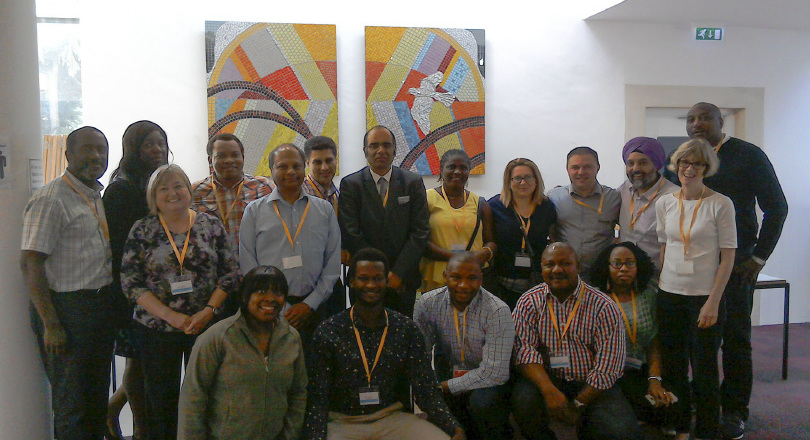Seventeen members attended the two-day residential event, from the Ministry of Justice’s National Offender Management Service, BT, O2, the Ministry of Defence, Babcock and National Air Traffic Services.
Speakers during the daytime sessions included Prospect deputy general secretary Sue Ferns, who set the scene in her welcome address, union president Denise McGuire and Ruskin’s course organiser Ian Manborde, who also co-ordinates the MA International Labour & Trade Union Studies.
In the evening guest speaker Liz Cameron talked about how she became involved in the trade union movement and her journey – not an easy one – from joining public service union Unison to winning the black members’ seat on its national executive.
The rich trade union heritage of Ruskin College provided an inspiring backdrop for tackling some of the concerns felt by Prospect BME members.
Interactive sessions including role play enabled participants to honestly self-reflect and evaluate their skills and strengths in the context of the future of work, and discuss how to enhance them within the workplace.
Discussion topics included turning perceived weaknesses into opportunities and how attendees could better support their BME colleagues. Coaching and mentoring were explored, along with communication skills and strategies for managing difficult conversations, including active listening and conflict resolution.
BT feedback
Participants gave great feedback about the event. Bharat Jain from BT pointed out that the sessions, which followed a pilot in 2015, chimed well with this year’s decision at Prospect’s national conference to proactively address the persistent under-representation of BME groups in many UK sectors and address pay inequalities.
David Ogunsade, a software graduate in mobile applications, said: “The training was an eye opener and got me thinking. I feel better prepared for career success because of what I have learnt.”
Kaljit Kandola from BT Openreach said: “The role-playing activities encouraged everyone to adapt new techniques they had learned, and I would like to see future sessions going into even more depth. It was valuable that we all shared what we had learned and our personal experiences.”
Christine Danniell, a lead commercial manager in BT’s business and public sector, said the course had challenged some of her perceptions, particularly around conflict resolution. She welcomed the opportunity for peer review, and found the speakers encouraging. “The course has given me the courage to ask for support from my manager and others,” she added.
Babcock feedback
Three participants from Babcock’s Rosyth Dockyard in Scotland, Christopher Nwachukwu, Seyi Esezobor and Mavis Amadi, said they were captivated by Elizabeth Cameron’s account of her personal experiences and inspired by her passion, energy and commitment. They also praised the materials and online resources provided for participants.
“This has been a hugely successful and beneficial seminar for us,” they said. “It was a great opportunity to meet and network with other professionals. We now look forward to applying the new ideas and skills we gained to further our professional and personal development.”
Their colleague Linda Ndebueze also welcomed the networking and interaction among participants, and the role play. She particularly valued the advice and discussion on mentoring and coaching and the differences between the two.
“It really helped participants identify what they need to develop their careers,” she said. “I also learned that not all mentors are suitable – you need to single out the right person with the right experience to suit your goals.”
The active listening role play enabled her to take away some great techniques to apply at work and in her personal life. “I believe the benefit of the BME development course is limitless and priceless.”
Roxana and Silviu Gavril also found the event interesting and informative. “It was supportive, interactive, fun, answered all our queries and provided more information on top,” they said. “We would recommend this course to everyone.”
NOMS-Ministry of Justice feedback
Annie Greenaway-Aubrey, a trainee forensic psychologist and Prospect rep, highlighted the case put by Liz Cameron for developing individual black workers’ representation at trade union national conferences.
She added: “Those of us within MoJ and NOMS also belong to black and minority ethnic support networks. With the help of Sue Ferns, we are exploring the idea of linking their work with Prospect’s commitments as a union. We look forward to making this happen.”
Mackenzie Nlemadim, of NOMS’ digital change directorate, said: “The day exposed me to the realities of what BME professionals face in the workplace.” Their professionalism, intellect and effectiveness could be swept under the carpet, with skin colour the only barometer used to measure their ability to do the work, receive mentoring or be sponsored to do major projects.
Mackenzie was encouraged by Prospect’s proposal to assist BME networks in Whitehall. “I believe this will drive the agenda for workplace equality.”
Paul Haughton, a Prospect member for more than 35 years and a design and deregulation programme manager at NOMS, said he was not surprised to hear of the race equality and discrimination challenges facing BME members and welcomed the ability to speak openly about these issues in a safe environment.
“In 2001 I was elected the first national chair of RESPECT, the BME staff support network at NOMS. I have also been active in the field of race equality since my days at university so I am not new to this subject.
“However, the seminar still provided the opportunity to increase my learning and expand my knowledge. It is very encouraging to see Prospect being proactive and taking the issue of race seriously.”
He, too, welcomed Prospect’s offer to form closer links with the NOMS BME network. “To be honest, I can’t wait. Let’s get the show on the road!”

